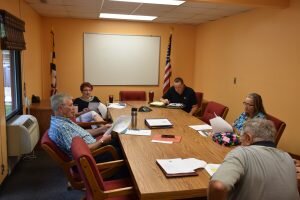By Greg Ellison
Staff Writer
(Sept. 19, 2019) Potential tweaks to the Ocean Pines Association voting processes, including switching from paper ballots to electronic measures, altering candidate forum rules and membership notifications were examined during the Elections Committee meeting on Friday.
Despite the 2019 board of directors election results already being finalized, Election Committee Chairman Steve Habeger said some tasks remain to be done this year.
“Unlike some years where you can take the whole winter off … we do have a little bit of work to do,” he said.
In light of the OPA’s recent purchase of NorthStar accounting software, Habeger said a decision on continuing to use paper ballots or updating to electronic voting systems is approaching.
“I understand NorthStar has quite a capability of handling that kind of thing,” he said.
Habeger said IT Manager Steve Grabowski has suggested mid-October would be an ideal time to discuss voting system options available through NorthStar.
“If it’s got to be accurate, you could do that with a chalkboard,” he said. “In the past, when we examined paper versus electronic voting, we decided … to stay with paper for a lot of reasons.”
The current scantron system employed for OPA elections has become challenging to maintain, as replacement parts are becoming nearly impossible to obtain, Habeger said.
“We’ve all talked about how the Scantron machine although it works … it’s like cranking up a ’43 Packard,” he said. “Someday we may open up that box and they’ll be a big oil stain under it.”
Committee member Brenda Wascak asked if the continued reliance on paper ballots was to accommodate non-computer literate residents.
Habeger said OPA bylaws require tha

The OPA Elections Committee outlined a slate of upcoming goals and reviewed voting data from the recent Board of Directors election on Friday.
voting systems serve the entire community.
Committee member Mark Heintz said that perspective seems dated.
“The argument that people don’t have access to a computer, that’s a small percentage I would imagine,” he said.
The expense also must be considered, Habeger said.
“Voting systems online are not free,” he said. “We spend at the park about $1 a vote.”
Absent supporting research, Habeger said he was unable to conclude that electronic voting systems would be a financial benefit for a community of roughly 8,400 residents.
“We do know the cost of paper ballot voting,” he said.
Heintz said the NorthStar-related meeting next month would provide an opportunity to vet the possibility of modernizing election systems.
“The key is we’re trying to go from the 1970s with Scantron into the 21st century,” he said. “I’ll settle with 2002 as opposed to 2020.”
Habeger said other technological upgrades are possible.
“I would like to have tablets for check-in for eligible voters at the annual meeting instead of that microscopic print,” he said.
Looking ahead to board of directors candidate forums next year, Habeger said a rules revision is being prepared to drop the current requirement of introducing the field in ballot order.
“I think that’s good for the candidates and for the audience,” he said.
Committee member Steve Tuttle said the proposal, when finalized, would have to pass two readings of the board.
One change that helps the committee itself is an increase in its budget from $15,000 to $25,000 Habeger said.
“Our [board] liaison looked at the potential of a referendum and included the potential cost,” he said
The additional funds will also help pay for the required notification of association members about upcoming elections.
“Recently, prior elections have not sent a first class mailing to ineligible members,” he said. “The bylaws require all, so we’ll take care of all.”
In the midst of preparing the committee’s annual report due in October, Habeger said election data has continued trending positively since 2017.
“All of these indicators are moving in a positive direction,” he said. “The majority of the improvement happened when Steve Tuttle was chairman.”
Intent on reducing the percentage of mismarked ballots, Habeger said in 2017 the committee, then under Tuttle’s tutelage, worked to redesign voting instructions.
The effort dropped the number of mismarks from 129 in 2017 to just 14 the following year, which was further dropped to seven in 2019.
“We did not include the ballot return rate because that’s independent of our efforts,” he said. “We encourage people to vote but it’s up to people to vote.”
While election trends were generally improved, Habeger said the ballot return rate dropped one percent in 2019 and continues to hover around 40 percent.
“We sent more ballots this year than last and got fewer returns,” he said. “We’d like 100 percent, but I don’t know of any election in a free society that gets that.”
